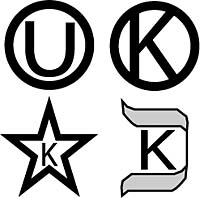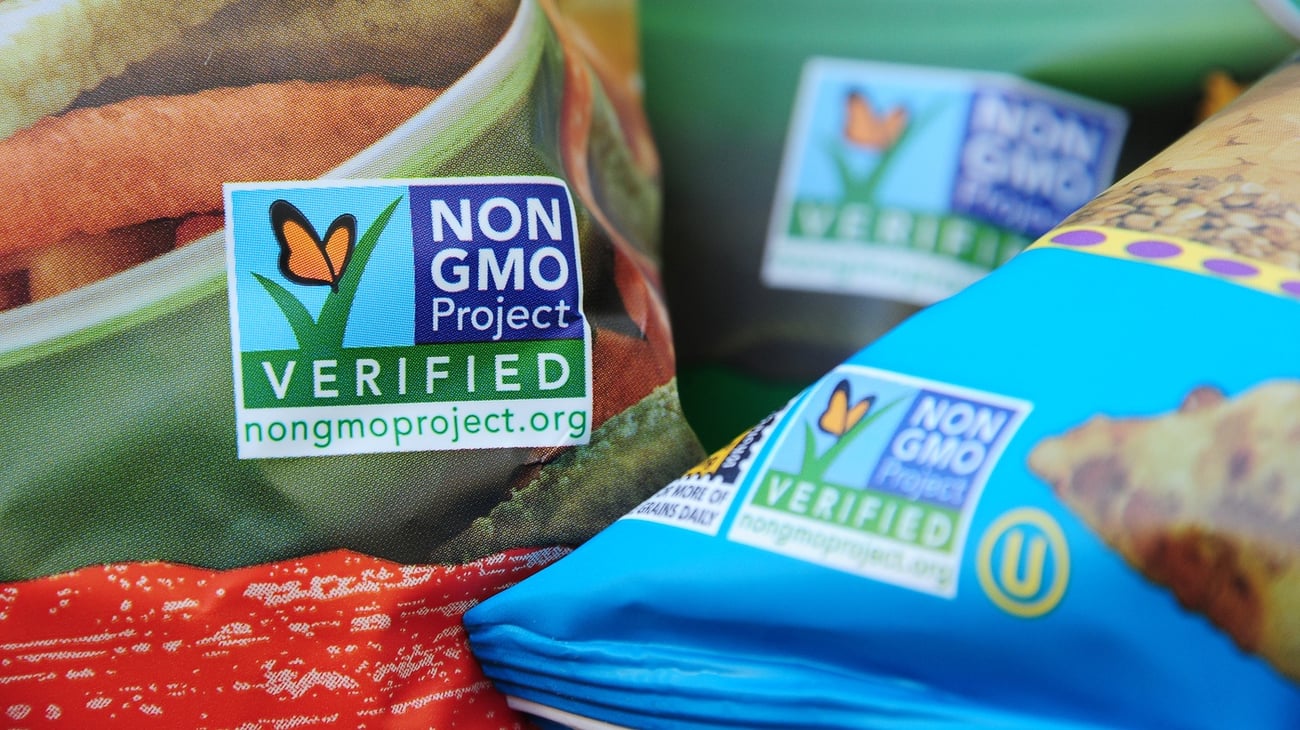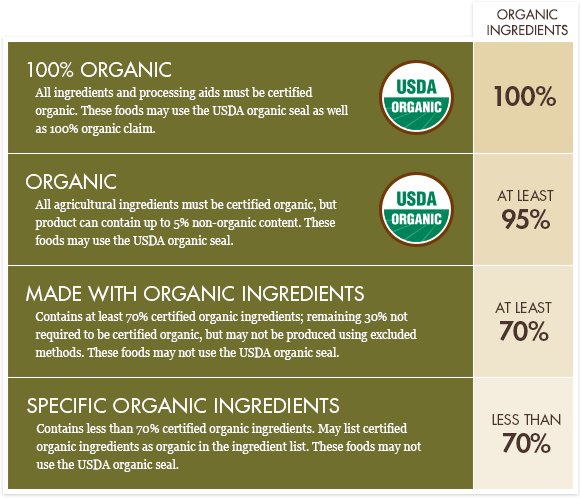Have you turned over the back of a snack food bag lately? You’ll now find a whole army of claims and seals that wouldn’t have been there 10 years ago. These claims border the line between quality seals and marketing descriptors, and help back up the quality of the food inside.
Why so many claims? This is something that’s picked up over the last few years as quality seals have increased in importance and more and more people hold allegiance to a certain type of diet like vegan or paleo.
Today I’m going to go through a list of the most common quality claims, so that you can both understand what’s commonplace in the industry and determine if you’re missing any marketing opportunities or quality seals that your product should be taking advantage of.
Consumers Ask: Wasn’t Your Product Always XZY? So Why The New Seal?
Sometimes consumers are confused when they see these quality seals on a product that don’t seem to fit logically. For example, I had a friend who looked at a container of peanut butter and it had a gluten free stamp on the side — “Gluten free!” she said, “Hasn’t peanut butter always been gluten free?!”
The answer is, of course, why yes it has. This peanut butter didn’t magically become gluten free when they put the stamp on the side. But the company also didn’t put gluten free on the side just because everyone else is. In fact, they put it there to preempt questions from customers and be as clear as possible.
Many of the questions fronted by food brands revolve around customers asking, “Is your product XYZ?”. Because of this, it has become easier to spell out what the food is and what it isn’t — often in picture form — on the back of the product packaging. Whether you consider this good customer service, education or marketing, that is up to you.
Kosher Certified
 "Kosher" is a Hebrew word that literally means "fit" or "proper." When used in relation to food products, "kosher" means that the item in question meets the dietary requirements of Jewish law. These requirements are set forward by the Jewish faith, and the dietary restrictions are followed year round.
"Kosher" is a Hebrew word that literally means "fit" or "proper." When used in relation to food products, "kosher" means that the item in question meets the dietary requirements of Jewish law. These requirements are set forward by the Jewish faith, and the dietary restrictions are followed year round.
Though the Kosher Laws are very complex, the basics of Kosher guidelines can be explained below, and pertain primarily to meat and dairy products.
The only meat allowed is those with cloven hooves and those who chew their cud.
- All shellfish is not permitted.
- All rodents and insects are not permitted.
- Meat must be also slaughtered in accordance with Kosher Laws, which includes having a Rabbi on site to ensure that the highest standards of kashrus are maintained.
- Once meat has been properly slaughtered, it must undergo a process known as kashering in order to drain it of blood, which the Torah prohibits for consumption.
- Meat and dairy must not be eaten together.
There are many different certifying agencies: over 1,400 around the world. For a full list with contact info, click here.
This is a basic quality seal, typically required if you want to sell into any grocery store in the US.
Non-GMO Project Verified

The Non-GMO Project Verification is a quality seal that has boomed over the last 3 years. The first time I saw this seal, I was at PPC in Seattle and a customer asked me about it later that week. Within 2-3 months, I was getting a storm of requests.
The Non-GMO Project can attest to this incredible influx of demand. They are known industry-wide for having long wait-lines for certification, because they are swamped with demand right now. In fact, they currently have over 35,000 products that are certified, which spans more than 2,500 brands.
You’ll now need this seal if you want to sell into Whole Foods, and you’ll most likely need it if you want to sell to Costco or any other major distributor or retailer. I expect that over the next 5 years, it will only become more popular.
USDA Organic
If you are selling an organic product, you’ll need to get organic certified. Depending on the percentage of organic ingredients in your product you can become any “level” of organic certified:
100% Organic Certified
All ingredients and processing aids must be certified organic. These foods may use the USDA organic seal as well as the 100% organic claim.
Organic Certified
All agricultural ingredients must be certified organic, but the product can contain up to 5% non-organic content. These foods may use the USDA organic seal.
Made With Organic Ingredients
Contains at least 70% certified organic ingredients; the remaining 30% is not required to be certified organic, but may not be produced using excluded methods. These foods may not use the USDA organic seal.
Specific Organic Ingredients
Contains less than 70% certified organic ingredients. May list certified organic ingredients as organic in the ingredient list. These foods may not use the USDA organic seal.
If you want to learn more about the process of getting USDA Certified, I’d suggest reading the following articles:
What Does It Take To Get USDA Organic Certified?
A Basic Review: The USDA Organic Seal

Gluten Free
 Because of how many people now have celiacs disease, gluten free products have proliferated in the last few years. Sometimes these products will come with a gluten free statement (they’re produced in a gluten free facility and use gluten free ingredients) and sometimes they will come with a stronger Gluten Free Certification.
Because of how many people now have celiacs disease, gluten free products have proliferated in the last few years. Sometimes these products will come with a gluten free statement (they’re produced in a gluten free facility and use gluten free ingredients) and sometimes they will come with a stronger Gluten Free Certification.
This Gluten Free Certification is a 3rd party audit similar to the USDA Organic Seal or the Non-GMO Project Verification where an independent party reviews paperwork and QA/production processes and confirms that all the products produced are in fact, gluten free as they claim.
If you serve a gluten sensitive industry (like cereal or bread) I’d highly recommend getting gluten free certified. If you serve an unrelated industry, it’s less important to get the certification but still good to include your own gluten free confirmation on your packaging if you are tracing all of your ingredients and processes in the same way that an independent auditor would.
Sustainable
Products that are sustainably sourced often use this claim on their products. And for good reason — a lot of time and cost goes into sustainably sourcing products. And as the saying goes, “if you got it, flaunt it”.
Sustainability is often built into the culture of young food companies and meets the growing demand from millennials that want to support a food cause, not just buy their dinner.
Natural
Natural has become a more main-stream descriptor that has lost much, if not all, of it’s meaning over the last few years because of the lack of standards and legislations surrounding this claim.
However, you’ll still find this quality claim on products by some of the more mainstream brands, especially those that are developing new lines specifically to meet the health food industry niche.
Fat Free
Though the discussion on the health of fats has come a long way in the last 20 years and healthy fats are now highly recommended, you’ll still find this claim, often on foods that don’t naturally contain fats like candy. You’ll also find it on the mainstream conventional brands that have special fat-free products (which I’m convinced will go out of circulation within the next 10 years).
You may have to look further, but you will still find this claim — though it’s steadily declining in popularity.
Vegan / Vegetarian
Vegan and vegetarian claims are often made on products, even though the product is often naturally vegetarian/vegan. This is a great example of the hesitancy the consumers often have that I explained before (Why does my popcorn now say vegetarian? Was it not vegetarian before??)
These seals works as an easy “yes/no” guide, so consumers don’t have the review every ingredient on the label to check if they contain meat or dairy.
It also helps confirm for consumers that your production process doesn’t cross-contaminate with meat or dairy (hey, they don’t know what the process looks like inside your facility — you can’t blame them for being curious!)
Paleo
Paleo diets have made huge gains in the last 5 years with the growth and popularity of CrossFit, the strength training regimen that strongly supports a paleo diet. This diet includes only foods that your paleolithic ancestors would have eaten: vegetables, grass-fed meats, fruits, seeds, nuts and healthy fats.
Because this diet doesn’t support the concept of processed foods, many food manufacturers have found a new way to tap into this in-demand industry by creating paleo-specific foods — for example, free-range meat protein bars or protein pancake mixes. And yes, we all see the irony in this.
Last year at Expo West 2015, paleo products were a hot trend just entering the industry. This year, they’re equally strong but a bit more common.
Clean Label
Clean label products are those than include minimal ingredients, and they all have to be recognizable and pronounceable as normal foods — no chemicals, artificial ingredients or additives.
Clean labels are highly popular right now since people are trying to avoid “processed foods” but still, at the end of the day, love the convenience of them. Clean label foods are as close to “homemade” as you’re going to get.
Topics: Industry Trends












